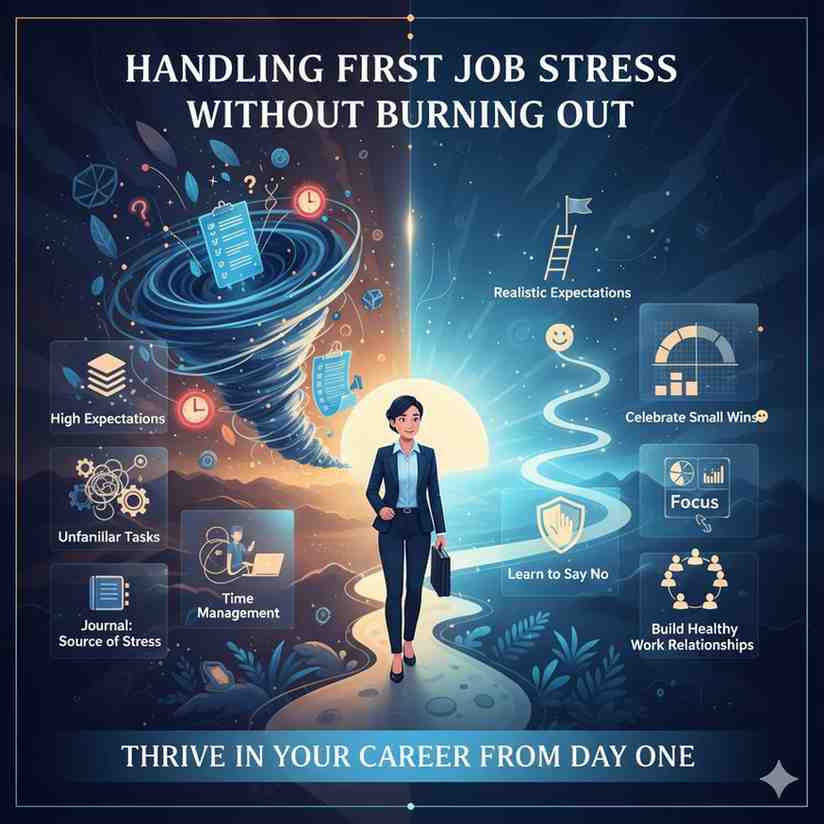Starting your first job is an exciting milestone, but it can also be one of the most stressful experiences of your life. The transition from student life or unemployment to the professional world comes with new responsibilities, expectations, and pressures. Many young professionals struggle with stress during this period, which can impact their productivity, mental health, and overall happiness.
The good news? With the right strategies, you can navigate first-job stress effectively without burning out. This guide provides actionable tips to help you thrive in your career from day one.
1. Understand the Source of Your Stress
Before you can manage stress, it’s important to identify what’s causing it. First-job stress typically arises from a combination of factors:
- High expectations: You want to prove yourself to managers and peers.
- Unfamiliar tasks: New responsibilities can feel overwhelming.
- Long hours: Adjusting to a structured work schedule is challenging.
- Work-life imbalance: Struggling to separate professional and personal life.
Actionable Tip: Keep a journal for the first few weeks to note situations or tasks that trigger stress. Awareness is the first step to effective management.
2. Set Realistic Expectations for Yourself
As a newcomer, it’s easy to feel the pressure to perform perfectly. But no one expects you to know everything from day one.
How to manage expectations:
- Focus on learning and improving rather than being perfect.
- Break tasks into smaller, achievable goals.
- Celebrate small wins, like completing a challenging project or learning a new skill.
Professional Tip: Seek feedback regularly. Constructive input helps you improve and reduces anxiety about your performance.
3. Prioritize Time Management
Poor time management can quickly lead to stress. Learning how to prioritize tasks and organize your day is crucial.
Effective techniques:
- The Eisenhower Matrix: Categorize tasks by urgency and importance to focus on what really matters.
- Time-blocking: Allocate specific time slots for each task to avoid multitasking.
- Task lists: Make a daily or weekly checklist to track progress.
By managing your time effectively, you reduce pressure and increase productivity.
4. Learn to Say No
As a young professional, it’s natural to want to please everyone. However, taking on too much work leads to burnout.
Tips:
- Evaluate if a task aligns with your role and priorities before accepting it.
- Politely decline or delegate tasks that are outside your capacity.
- Remember, setting boundaries is a professional skill, not a weakness.
5. Build Healthy Work Relationships
A supportive work environment can significantly reduce stress. Networking, mentorship, and friendships at work help you feel confident and motivated.
How to build relationships:
- Engage in casual conversations with colleagues to build rapport.
- Find a mentor who can guide you through challenges.
- Participate in team activities to feel included and supported.
6. Focus on Self-Care
Your physical and mental well-being is critical in handling stress. Neglecting self-care can quickly lead to burnout.
Self-care strategies:
- Maintain a healthy diet and exercise regularly.
- Ensure you get 7–8 hours of sleep every night.
- Practice relaxation techniques such as meditation, yoga, or deep breathing.
Even small daily habits can have a major impact on your energy and stress levels.
7. Manage Expectations with Your Manager
Clear communication with your manager can prevent misunderstandings and reduce stress.
Tips for professional communication:
- Discuss your workload and priorities openly.
- Ask for guidance when you’re unsure about tasks.
- Regularly update your manager on progress to build trust and confidence.
8. Develop Stress-Relief Techniques
Having quick strategies to calm your mind during stressful moments can prevent burnout.
Practical methods:
- Take short breaks throughout the day to refresh your mind.
- Use mindfulness exercises to stay present and focused.
- Listen to calming music or take a brief walk when feeling overwhelmed.
9. Focus on Learning and Growth
Instead of viewing challenges as threats, treat them as opportunities to grow professionally.
How to cultivate a growth mindset:
- Reflect on mistakes to identify lessons learned.
- Seek opportunities for training or skill development.
- Celebrate your progress and achievements, no matter how small.
10. Know When to Seek Help
Sometimes stress can become overwhelming, and it’s important to recognize when professional help is needed.
Signs to watch for:
- Persistent anxiety or irritability
- Difficulty concentrating
- Physical symptoms like headaches or fatigue
Solution: Consider talking to a counselor, therapist, or mental health professional. Seeking help is a sign of strength, not weakness.
Final Thoughts
Starting your first job is a significant life transition, and it’s normal to feel stressed. The key is to approach it strategically: understand your stress triggers, manage your time, set boundaries, prioritize self-care, and focus on growth. With the right mindset and tools, you can handle first-job stress effectively and lay the foundation for a successful and fulfilling career.
Remember, stress doesn’t disappear overnight, but consistent effort can help you manage it without burning out.
💡 Tip: Want more actionable advice for young professionals? Check out our ebooks on career growth, stress management, and professional development for in-depth strategies that help you succeed in your first job and beyond.



